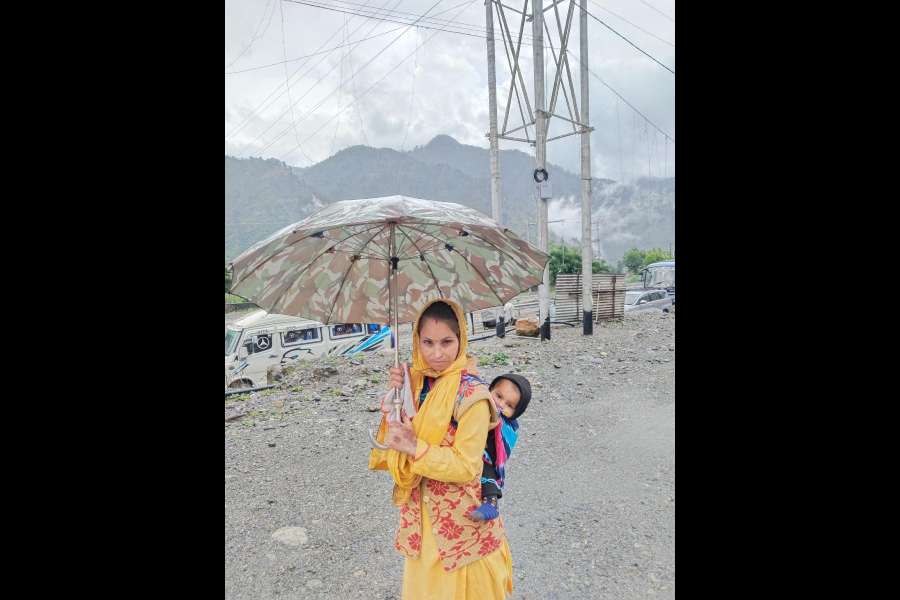Mothers carrying babies walked hours in mountainous terrain to vote. Many braved the rain. Other voters waited patiently till landslide-hit roads were cleared.
Some families of a more nomadic persuasion travelled hundreds of kilometres from their current locations to the polling booths where they were registered.
It may have become a cliché to call the Indian general election a festival of democracy, but the voters of the sprawling Udhampur-Kathua-Doda made you want to believe the sobriquet on Friday.
By 5pm on a day nature proved unkind, unofficial reports put the turnout at 65 per cent, but the final figure was certain to go up.
The constituency — one of two in Jammu — has been a Hindutva citadel, having voted BJP with wide margins in 2014 and 2019. However, conversations with the voters on Friday suggested the battle could be more even this time.
The incumbent Jitendra Singh, minister in the Prime Minister’s Office but widely condemned here as an “absentee MP”, is pitted against Choudhary Lal Singh of the Congress.
“If the BJP wins, it will solely be because of Modi; but if it loses, Jitendra Singh will have to share the blame,” an unemployed graduate turned polling agent for the BJP said in Udhampur.
For many traditional BJP supporters, however, the Modi factor has lost its sheen following the scrapping of Article 370 provisions in 2019. They fear an assault from outsiders on their cherished Dogra identity, and on their jobs and land.
The outcome will be known only on June 4. But the real story on Friday was how voters — many of them living in homes perched atop mountains and looking like dots from a distance — came down in numbers to show their faith in democracy.
A woman from Chanderkote village, carrying her baby on her back and wielding an umbrella, said she had trekked an hour and a half downhill to reach the booth.
“It will take me double that time to go back as going uphill is cumbersome,” she said.
In these parts, the umbrella serves not just as a shield against the rain but as a walking stick — a necessary insurance against the treacherous terrain.
Chanderkote, home to around 2,000 people and surrounded by hills, is a melting pot of Jammu and Kashmir’s cultures and stands midway between Srinagar and Jammu on the national highway.
The village is part of the Ramban Assembly segment, home to Dogras, Kashmiris, Gujjars and Pogalis. To its north is Banihal, which is overwhelmingly Kashmiri, and to its south is Chenani, overwhelmingly Dogra.
Ramban tehsil has a Muslim-majority population but most of its residents see themselves as part of the Dogra culture. That perhaps explains why Ramban Assembly seat — where Muslims make up about two third of the population — elected a BJP candidate during the last state elections, in 2014.
On Friday, many Muslims said they would not vote for the BJP this time because of its policies since 2019.
Udhampur-Kathua-Doda is Jammu and Kashmir’s largest constituency: at 16,707sqkm, it exceeds the area of the entire Kashmir valley by around 800sqkm.
Mohammad, a shepherd from the tribal Gujjar Bakerwal community who gave only his first name, said he had travelled 200km from Kathua, his journey interrupted for hours by (another) landslide that blocked the road at Duddar Nallah.
“We are from Chanderkote and are listed as voters there. Around 20 of us, including women, left our (current) Kathua dwelling around midnight to come here to vote. We had to wait for hours until the road was cleared,” he said.
“Bakerwals face a host of issues. We are frequently harassed and stopped by police on the pretext that we are involved in cow smuggling. We have to apply for multiple permissions to move from place to place with our sheep and cattle. We faced no such restrictions (before 2019).”
The Srinagar-Jammu national highway has witnessed marked improvement over the years but its most difficult stretch, the 36km from Ramban to Banihal, remains incomplete despite tall promises. The stretch continues to claim lives in accidents.
Udhampur voted on Friday











